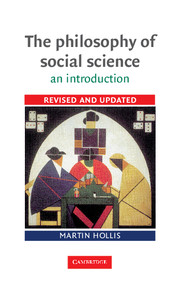Book contents
- Frontmatter
- 1 Introduction: problems of structure and action
- 2 Discovering truth: the rationalist way
- 3 Positive science: the empiricist way
- 4 Ants, spiders and bees: a third way?
- 5 Systems and functions
- 6 Games with rational agents
- 7 Understanding social action
- 8 Self and roles
- 9 Explaining and understanding
- 10 A value-neutral social science?
- 11 Rationality and relativism
- 12 Conclusion: two stories to tell
- Bibliography
- Index
10 - A value-neutral social science?
Published online by Cambridge University Press: 03 July 2012
- Frontmatter
- 1 Introduction: problems of structure and action
- 2 Discovering truth: the rationalist way
- 3 Positive science: the empiricist way
- 4 Ants, spiders and bees: a third way?
- 5 Systems and functions
- 6 Games with rational agents
- 7 Understanding social action
- 8 Self and roles
- 9 Explaining and understanding
- 10 A value-neutral social science?
- 11 Rationality and relativism
- 12 Conclusion: two stories to tell
- Bibliography
- Index
Summary
There are still two stories to tell about the social world and how it works. We are not yet sure how radically they differ. One starts as an insider's or agent's story about what social life means and the other as an outsider's or spectator's story about the causes of social behaviour and events. But both stories, the naturalistic as much as the hermeneutic, have versions where action is rationally reconstructed from an internal point of view. Both can recognise that social life is set in a material world and that variations in circumstance and resources, individual or collective, affect what goes on. It is not as if naturalism dealt only in material conditions and behaviour, and hermeneutics only in action and the fabric of ideas.
The difference has more to do with whether Explanation or Understanding holds the final ace. Even this is complicated by dispute about which cards belong in which hand. Naturalists can argue that, since reasons for action are causes of action, rational reconstruction is an explanatory process similar in principle to any other identification of causal order in nature. Moreover, since the institutional arrangements of a culture influence action only through the beliefs and desires of agents, questions about how precisely to slot human psychology into social contexts are typical of scientific questions at large and do nothing to challenge the scope of naturalism. Conversely, hermeneutics can retort that a psychology which works with meanings and reasons is thereby radically unlike a natural science, not least because the style of analysis needed for rules, norms and roles prevents our regarding the relation of social to psychological elements as one of cause and effect between distinguishable items.
- Type
- Chapter
- Information
- The Philosophy of Social ScienceAn Introduction, pp. 202 - 223Publisher: Cambridge University PressPrint publication year: 1994



